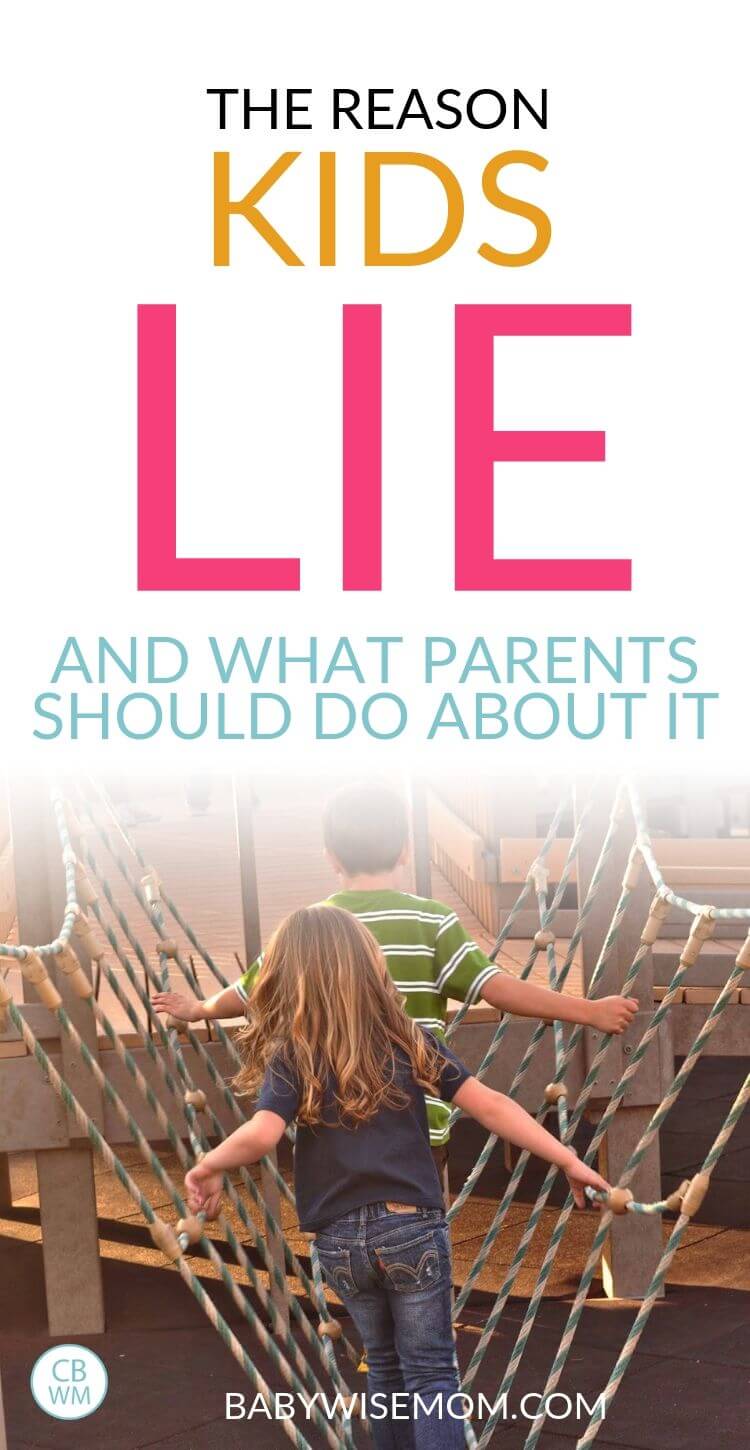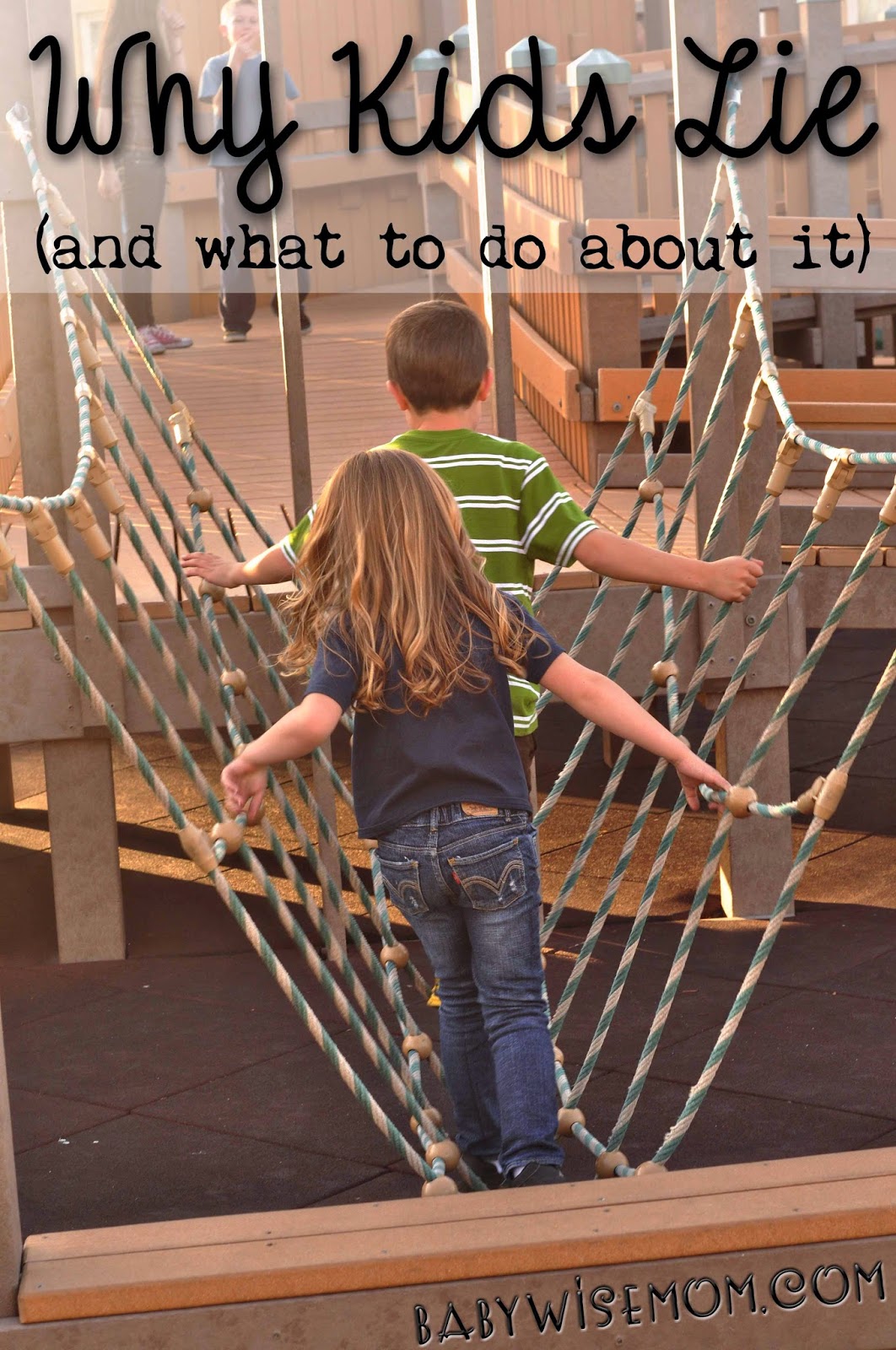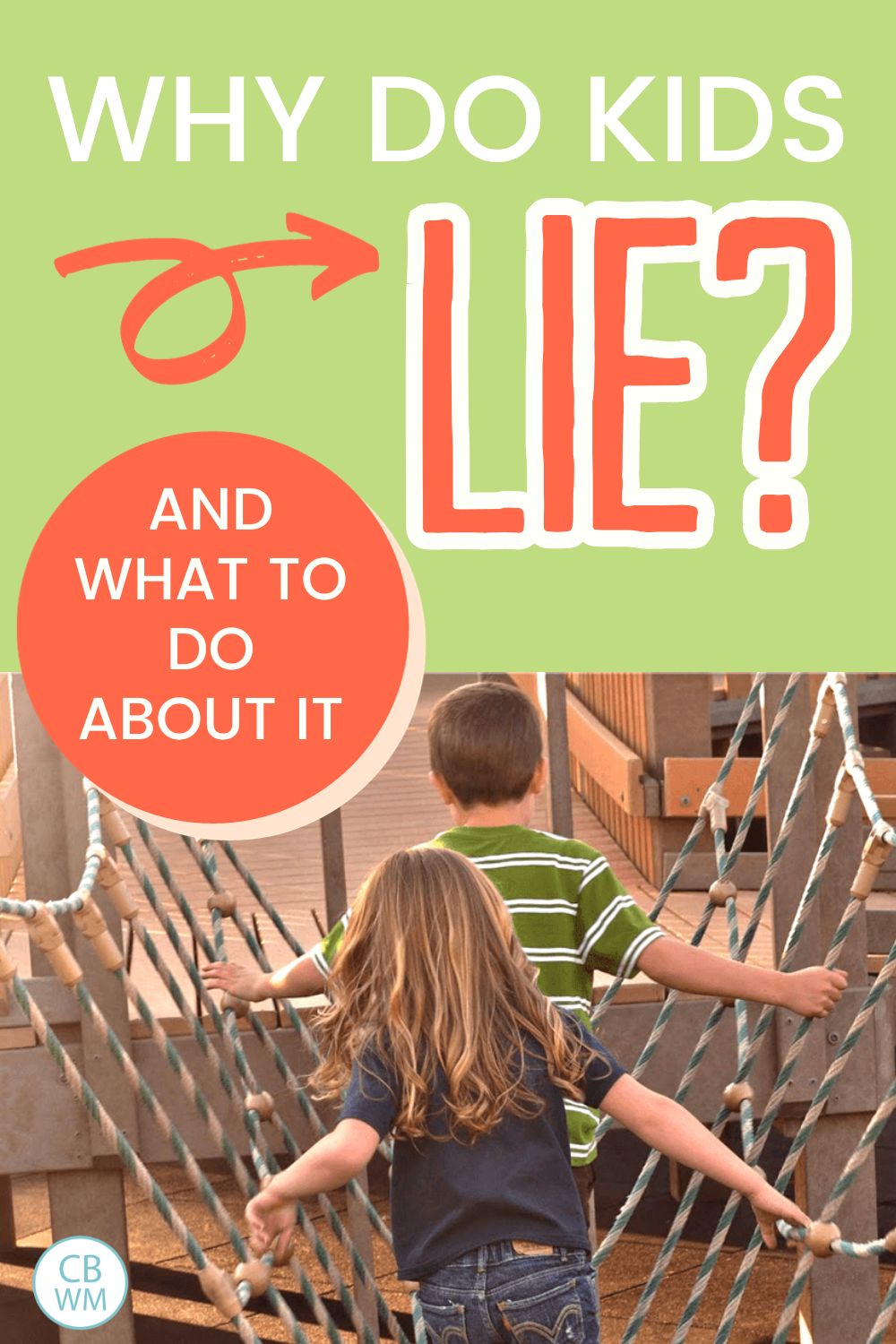Why Kids Lie and what to do about it. Understanding why children lie and what parents can do to help children learn to be honest. Learn the facts about kids lying and why it is developmentally appropriate, the reasons kids tend to lie, and how you should respond when your child does lie.
The first time you catch your young child in a lie, you are probably mortified. For me, honesty is very important. Something that upsets me the most as a parent is when a child lies. Most children start out as completely honest. As time goes on, they learn to lie.
As my kids got older, I had a few that weren’t prone to lying and one that would lie and was in fact quite good at it.
As hard as it is to comprehend your little sweetie lying, it is indeed a normal part of development. A child will start to lie and then need to develop self-control to be able to resist lying.
A while back, I told you about a book I absolutely love called Nurture Shock. This book has a chapter dedicated to lying. Let’s discuss.
Facts About Kids Lying
First, here are some interesting tidbits about children lying based on studies that have been done (found on page 75):
- People cannot tell when children are lying.
- People believe girls lie less often than boys (this is a false belief and not true).
- People believe younger children lie more often than older children (also not true–I am surprised anyone who has had a child would believe this. The opposite has been found to be true).
- People believe introverts lie more often than extroverts (introverts actually lie less often. They just don’t have the social skills to seem honest).
More interesting information from pages 80-82:
- Most 3 year olds do not lie. If they do, follow-up questions usually cause them to admit to it. This will also mean it is rare for toddlers to lie.
- By age 4, almost all kids start to experiment with lying. This is very common in the preschool years.
- Children with older siblings seem to start earlier. They will have seen older kids lie and learned from them.
- The better children are at distinguishing lies, the more likely they are to lie themselves.
- Most lies children tell to parents are to cover up a transgression.
- Young kids start out thinking all lying is bad and slowly learn that some types of deception are okay. Most people think children start out not believing lying is bad, but the opposite is true.
- Children don’t care about the intent behind lies. A lie is a lie. “Any false statement–regardless of intent or belief–is a lie” (page 81).
- More intelligent children are more likely to lie and/or are better at it.
Let’s get into the why behind the lying. What is the motivation to lie.

Why Kids Lie
So why do kids lie? One thing to know is lying is a developmental milestone. In other words, it is age-appropriate. This means your child will experiment with lying. It is just as likely to happen as your child learning to wave good-bye or walk.
It doesn’t mean that you don’t try to stop the lying, but it does mean your child is NOT terrible and you haven’t failed. “It’s to be expected, and yet it can’t be disregarded” (page 90).
Children also lie to avoid punishment. This is a huge reason for lying. When they are young, they will lie about something even if you witnessed it. As they get older, they get smarter and only try to lie about what you didn’t see.
As children develop empathy and are more socially aware, they will lie for reasons other than avoiding punishment. They might lie to avoid hurting feelings. This is a sign of your child’s social development. If they get a gift they hate, they might pretend to like it (aka lie) so they do not hurt the gift-giver’s feelings.
They might lie to keep a secret. They also might start to do it to manipulate, assert status, or fool parents. They also might do it to get attention.
“Lying is a symptom–often of a bigger problem behavior…It’s a strategy to keep themselves afloat” page 83. There could be a lot of possible problems. Too much freedom. Too little freedom. Frustration at school. Frustration at home. Being picked on. There are a lot of potential issues going on.
>>>Read: How Too Many Freedoms Leads to Disobedience
Children also lie because they see parents lie. Remember how a lie is a lie to a child? “Any false statement–regardless of intent or belief–is a lie” (page 81). So you telling someone you are busy when you aren’t is a lie and that is no different to your child than any other lie. As parents, we need to be good role models. See More is Caught Than Taught, Teaching Virtue and the Importance of YOU, It Starts With You, Be a Good Sheep, and You Teach What You Are.
Sometimes we teach children to lie in our effort to teach them to be polite. “Consider how we expect a child to act when he opens a gift he doesn’t like. We expect him to swallow all his honest reactions…and put on a polite smile” (page 86). Remember, to a child, a lie is a lie. That includes white lies. Children are taught to give white lies, however, and over time “They learn that honesty only creates conflict, while dishonesty is an easy way to avoid conflict’ (page 87).
Some kids will lie because the do not want others to worry. So kids might keep feelings, thoughts, or actions from parents and peers to avoid the concerns and anxiety that might come up from those actions.
Get your copy of Nurture Shock here (affiliate link).

What To Do About Kids Lying
Here are some things to do when you know your child is lying.
Be sure freedoms are appropriate
If you are being too strict and withholding freedom, your child will be inclined to lie. If you are too permissive and allowing freedoms your child isn’t ready for, he is going to get himself into situations he needs to lie to get out of. Or he will lie because he wants more structure at his core.
>>>Read: How To Be an Authoritative Parent
Address both the lie and the cover-up for the lie
Do not let lies go by unaddressed. I once had a child do something I had explicitly said not to do. When the child was caught, an elaborate story was told. It seemed perfectly believable. She looked believable. If I didn’t know that it couldn’t possibly be true, I would have completely believed her (unfortunately for her, she used Brinley as a scapegoat and Brinley was in bed during the time she supposedly did the crime. Oops). She lost the thing in association with what she was not supposed to do. Then she lost a favorite privilege for a week for the lying.
Consider what could be wrong
What is it that is driving your child or teen to lie? Remember “Lying is a symptom–often of a bigger problem behavior…It’s a strategy to keep themselves afloat” page 83
Do not threaten punishment
“…scholars find that kids who live in threat of consistent punishment don’t lie less. Instead, they become better liars…” (page 85). This doesn’t mean you don’t offer consequences for lying, just don’t have the threat hanging over the head. You don’t want your child to get away with lying. If so, then lying will continue. Why wouldn’t your child lie if lying worked in the past? You just aren’t holding this “fear of punishment” over the head at all times.
Be consistent with consequences
Consequences are always more effective if you are consistent in giving them. You also want to be consistent with what the consequences are in relation to the crime. Be predictable. And see it through.
Don’t give in and lighten the rules up. Don’t ever give a consequence you don’t intend to see through to the end.
I have to caveat and say on rare occasion, you might decide your punishment was not appropriate and you change it. Let this be a rare occasion. Think before you dole out punishments.
If you need to, tell your child you need to think on it for a bit. It is okay for you to think about what are appropriate consequences before you give them out.
This is not always easy, especially as you get tweens and teens lying. They will push back on consequences more.
Do not set traps
Also, do not “entrap” your child. To entrap your child is to ask a question you know the answer to in order to see if your child will lie to you or not. This is setting your child up to fail.
Require restitution
Require restitution for the lie and any effects of the lie. If your child’s lie harmed someone or something, require your child do what he can to make it right. This might require verbal apology, writing letters, community service, manual labor, or money. Your child needs to make it right.
Do not tell your child that he is a liar
Do not label your child or tell him or that he is no longer able to be trusted. People live up to the expectations put before them. If you expect your child to lie, he likely will. If you expect him to be honest, he likely will be.
Recognize when your child is honest and offer praise for doing so
Thank your child for his honesty. Recognize how hard that must have been for him. Remember, consequences are important. Being honest when something wrong was done should not excuse consequences for the wrong action.
Once again, you want a consequence for poor actions and for lying. If your child make a wrong choice but is honest about it, then there is just a consequence for the poor choice.
Read stories that help
Read the story about George Washington and the cherry tree–but not The Boy Who Cried Wolf (see pages 83-84). Studies have found that after hearing the wolf story, kids lie more. After the cherry tree, boys lie 75 percent less and girls 50 percent less. And in case you are wondering, this study was true of children who were not from the USA. This works because children want to please their parents–make them happy. Hearing that Washington’s father valued honesty so much teaches children that parents value honesty.
Teach the value of honesty
This leads us to teach the importance of honesty, not just that lying is wrong (page 86). This goes along with the idea that you should teach the virtue of the vice rather than focusing on the vice.
Sometimes we assume our children will just know what we value and what we do not. Studies find adolescents are less likely to drink underage if they know their parents do not approve. If they have never been told “Do not drink”, they are more likely to do it.
If a teenager needs to be explicitly told “Do not break the law and drink” to make them more likely to do it, then a young child, preschooler, tween, and teen will all need to be told, “We value honesty and want you to tell the truth.”
Teach your child to have charity
Charity is the pure love of Christ. If you have charity for others, you love them as Christ loves them, which is perfectly. Obviously, we can’t be perfect at it like He is, but we can try. When we love others perfectly, we see fewer of their faults and have less of a need to tell white lies because we focus on the positive. See Teaching Charity for more.
Do not bail your child out with lies
If your child is in a bind, do not bail your child out by telling lies. This will clearly be a bad example. For example, if your child forgets to do her homework, do not contact the teacher and say, “Suzi was so sick last night and just couldn’t do her homework.” If you demonstrate that lying is okay to get out of a sticky situation, you cannot later require honesty. Even little white lies can lead you down a path you don’t want to follow.
Get your copy of Nurture Shock here (affiliate link).
Read More on This Blog

This post first appeared on this blog in September of 2014


